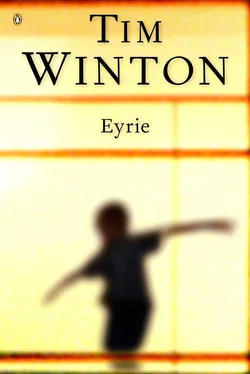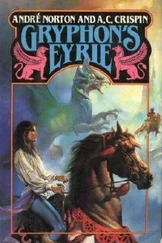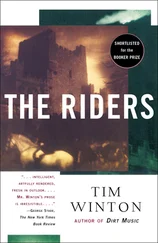The Buck girls. From up the hill. They were in the house so often, those kids, like permanent fixtures. And actually lived with them for part of one year: 1971, maybe, or ’72. He could see it crisply, all of them in the lounge, on their bellies, with the TV flashing in glorious black and white. Little Gemma at one end of the tartan travel rug, and his sister Faith beside her. Then him, next to Baby Buck, the older one. The girls in their flannelette nighties, him in his goofy pyjamas. The old man behind them all, chortling in his recliner-rocker. Flip Wilson, who seemed to look blacker in black and white. Everyone yelling in joyful unison: Here come de judge!
Little Gemma Buck. She came to mind along with McHale’s Navy , Herb Alpert and the Tijuana Brass, primary school. She belonged to the golden time before his world collapsed. When Nev was still with them. And, man, did Nev love that Flip Wilson.
Keely gave the food another crack, chewing his way back.
Gemma was a mouth-breather, now he thought of it. Cute enough in a Cindy Brady way, but clingy, too. She was completely unlike her big sister. And kind of annoying for always being around. But they were a protected species, those girls; they had problems, trouble at home for which you had to make allowances. Faith and he learned to let a whole lot of things slide in order to spare themselves a Disappointed Lecture from the oldies.
Keely thought of the hundred nights the Buck girls came knocking: summer evenings out there on the porch sobbing in their nylon nighties, the sound of glass breaking up the hill behind them. There was always screaming; their place was bedlam after dark. Fridays were the worst, when Johnny Buck drank his pay right up to closing time and did not care to be admonished by the missus when he came home shitfaced and broke with a couple of brown baggers under his arm and a torn shirt hanging off his back. The beltings were fearsome and public. No one ever called the cops. The girls would just be at the Keely door, whimpering on the porch until a light went on and Doris took them in. Then the old man would go looking for his boots, gathering his wits a moment, muttering some prayer or imprecation, before trudging up the hill to deal with it best he could.
In those days the Keelys didn’t have trouble, they fixed it. By faith, with thanksgiving. And now and then, when the shit hit the fan, with a judicious bit of biffo.
The oldies were careful to shield his sister and him from the carnage in the street, but some mayhem got past the cordon sanitaire. Keely had flashes of recall that would never fade. They were, he supposed, his first experiences of violence. And it was always strange how foreign they seemed, these memories, for all their lurid immediacy, because although they were inescapably from his old neighbourhood they did not feel as if they belonged to his world, not then, not now. But he could still see it, wild and vivid as a nightmare. He saw Bunny Buck. The girls’ mother. Mrs Buck. On her knees on lumpy buffalo grass. In her front yard. Down on her knees with a sanitary pad pressed to her bleeding face. He didn’t even know what a pad was until years later. She had it planted against her swelling jaw as if any form of softness might be a comfort. As shadows flayed her. Two men facing off in the driveway. Johnny Buck in his work duds. Neville Keely in stubbies and a singlet. Plenty of lights on across the road, next door, silhouettes in every front garden, but no help forthcoming. In the porchlight, Nev circling, voice like a horse whisperer, sleep in his eyes and grease in the cracks of his hands. Johnny Buck staggering, squinting to keep him in view. Nev pressing in, smiling, feinting, nattering about Forgiveness, and Letting Go, and Owning Up, and Giving In to Love, a kind of dancing, panting midnight homily brought to a head by a sudden lunge and a half-nelson that had the nasty little prick on his arse in a moment. And it was hard to forget the sight of a big man like Nev blessing Johnny Buck while burying his face in the grass. The faceless neighbours cheered; he remembered that.
So where had he been standing that night? Had he snuck away at last to see for himself, left Faith and his mum and the girls inthe house and skulked his way from yard to yard to witness what it was that bent their nights out of shape? Or were the girls there, too, shrieking, clutching at Doris, imploring the spineless spectators? He didn’t remember. He could only see Johnny Buck struggling and swearing on the grass. His father copping a few in the chops for his trouble. And then Nev abruptly prevailing, kneeling on him, like a man in prayer, pinning the shithead’s arms to the earth until the bloke was weeping. A moment later his wife was at his side to comfort him and call Nev a churchy fuckin bully-bastard who should mind his own bloody business.
It was confounding. And it felt wrong that her humiliated fuck-you should remain as indelible as the violence itself. But even now the memory brought a welter of shame along with the pride.
It was the year Harold Holt drowned. Somehow that fact had stuck in his head. But Keely knew it had been happening since Menzies was prime minister. It went on until Whitlam. It was standard procedure in Blackboy Crescent. When some addled boofhead started playing up the neighbours sent for good ole Nev. He was the holy fool with hands like mallee roots and a heart, while it lasted, as big as a beer keg. Night after night, they sent him out and let him bear it all. And hung back in the shadows, urging him on from a cosy distance.
Keely finished the stir-fry. He was still standing. Not quite as calm as he’d been looking down on the birds. Agitated by the memory. But the weight in his head had lifted a little, the disgruntled passenger was dozing.
He felt odd now. But not so terrible. Better, even. As if Gemma’s sudden appearance had kicked him out of a spin. Something new, unexpected. Okay, maybe old and unexpected. To take his mind off the five thousand things he was frying his own wiring over. It was kind of nice to go on a fresh tangent. To sieve through the memories.
But what could he really remember? About Gemma, specifically? Not that much, actually, now he thought about it. Apart from the sight of her and her sister huddled beneath Doris’s dressing gown, mewling like pups. And those blonde plaits. Not much else at all. Because it was the older girl, Baby, who’d made the impression. She was tough, chubby, kind of clammy, and foul-mouthed. He’d copped a flogging from her once at school in front of a dozen boys; he didn’t remember why — just recalled the laughter and the exploded feeling in his cheek. Baby gave off a strange current. Boys noticed her, said things to her, and so did men. When she lived with them those months, when her father was in prison and her mother still in hospital, Keely noticed her vaguely horticultural scent and the peculiar formality with which his own father addressed her. Nev was not a cautious man, but around Baby Buck he was careful, almost courtly.
The Buck sisters. They were strays who couldn’t be shaken off until the Keelys were gone themselves, swept away by disaster into a new life. For Faith and him those teen years were fogged with grief. The Bucks just fell away with everything and everyone else. After Blackboy Crescent he hardly thought another thing about them.
But had caught sight of them occasionally. Must have been the late seventies when he walked past Baby in Barrack Street one night. Tilted against a wall, one shoe broken. She looked drug-fucked, or just fucked in general. There was an awkward moment of mutual recognition but no greeting. A couple of times he saw Gemma at a distance. At a concert, a pub. Under the arm of one dangerous-looking dude or another. She was all tan and sunstreaked tresses, a leggy provocation, and by then, for the likes of him, a total impossibility. Their gazes met but Keely pretended not to see her. Remembered how his ears glowed for shame.
Читать дальше












